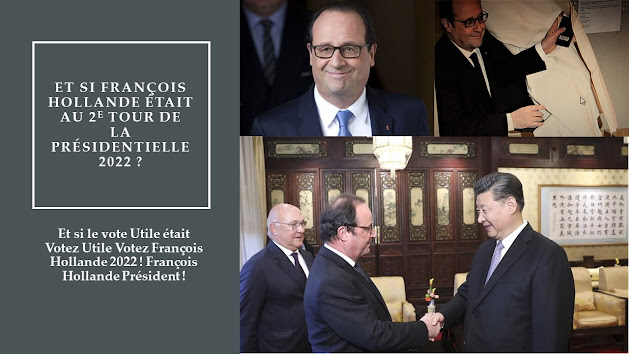Et si François Hollande est au 2e Tourdes presidentielles
What if President
François Hollande was in the second round?
The organizers of the
popular Primary aiming to lead to a joint left-wing candidacy in the 2022
presidential election have announced that they have gathered 467,000 registered
voters whose origins (Caribbean, French West Indies Islands, Guyanese, people)
in metropolitan France are unknown, nor their political affiliation. Because
right-wing voters can also as well as right-wing candidates from all walks of
life can register and vote only with the condition of paying €2 euros (467,000
peoples *€2 euros = €934,000 euros in cash!) So the case of French Primaries is
rather a matter of money and also to impose oneself, to have a vision, a place
and above all a “media availability” and bail out the coffers for the
legislative elections next June 2022. The whole thing, it is a real joke! As
French political men and women has tried to imitate the US Primary elections,
often abbreviated to primaries. It is a process by which voters can indicate
their preference for their party's candidate, or a candidate in general, in an
upcoming general election, local election, or by-election. Depending on the
country and administrative divisions within the country, voters might consist
of the public in what is called an open primary, or solely the members of a
political party in what is called a closed primary. In addition to these, there
are other variants on primaries (which are discussed below) that are used by
many countries holding elections throughout the world.
The origins of primary
elections in France can be traced to the Jacques Chirac party, which aimed to
take the power of candidate nomination from party leaders to the people and
reduce seven years presidential term to a presidential quinquennial (to five
years). However, political parties control the method of nomination of
candidates for office in the name of the party. Other methods of selecting
candidates in France include meetings, or individually but it takes 500
signatures from the Mayors of France towns or villages to be an official candidate.
Even if the conditions
and perimeters of registration differ, this figure is much higher than the
number of people registered for the votes organized by Europe Ecologies Les
Verts (122,670 voters with a participation rate of 86.91%) or by Les Republicans
(113,038 voters for 140,000 members) and seems to show a certain interest in
the idea of a single and unified leftist candidacy. Apart from Christine
Taubira, the three main candidates (Anne Hidalgo, Yannick Jadot and Jean-Luc
Mélenchon who were not consulted, they were not contacted on this subject! But
they were automatically registered without any consent) announced that they
would not recognize this vote even though their name was among the possible
choices against their will. While the polls seem to condemn all of these
candidates to elimination in the first round of the 2022 presidential election,
such a position does not fail to question. Can the concept of “competition”,
stemming from strategy research, and a historical perspective help us to better
understand these strategies, a priori doomed to failure?
Competition, an
alliance between competitors The term competition is a neologism resulting from
the combination of the words cooperation and competition and refers to forms of
collaboration between competing companies.
The French political
field, competition can concern collaboration between right-wing and left-wing
parties, such as in the context of a government of national unity or during an
episode of cohabitation. It can also be an alliance between parties of the same
political persuasion within the framework of a common program or common
candidacies for an election.
The French left, a
look back at past presidential elections provides a better understanding of the
advantages and disadvantages of such a strategy in 2022.
The left in the
presidential election: between union and disunity
In 1969, the absence
of a strategy of competition between the five left-wing candidates (out of a
total of seven candidates) led to a second round between the Gaullist Georges
Pompidou and the President of the Senate, the centrist Alain Poher.
In 2002, the five
left-wing candidates, qui i are added to the scores of far-left candidates
Arlette Laguiller and Olivier Besancenot (who obtain 5.72% and 4.25%
respectively) once again contributing strongly to the absence of left-wing
candidate Lionel Jospin in the second round and to the surprise qualification
of far-right candidate Jean-Marie Le Pen.
Conversely, the 1972
Common Program between the Communist Party, the Socialist Party and the Left
Radicals served as the basis for the 1981 election of François Mitterrand, the
first left-wing president of the Fifth Republic.
The Plural Left
government coalition of 1997 also enabled Lionel Jospin to win the legislative
elections following the dissolution of the National Assembly decided by Jacques
Chirac and to be appointed Prime Minister. These examples seem to legitimize
the idea that competition between competing left-wing forces guarantees winning
a presidential or legislative election under the Fifth Republic. However, it
must be put into perspective.
History has shown that
the left is capable of winning without going through a union strategy from the
first round. This was the case in 2012 with the election of President François
Hollande.
And we must also
remember that the Common Program was no longer officially in force (it was
abandoned in 1977) when President François Mitterrand was elected in 1981, all
the other candidates from the left had a common project and values with
Mitterrand. The time when the right/left divide alone structured
political confrontations and referred to a struggle between two models of
society, one capitalist and liberal and the other regulated and social, is now
long gone.
The divisions on Europe, secularism, ecology, or the Nation, to name but
a few themes, now constitute fracture lines that are a priori more marked than
the right/left divide and make it more difficult, beyond the problems of
people, the connections. Mutualization of ideas and balance of power A
competition strategy implies a pooling of ideas and forces, which therefore
seems complicated to put in place and which cannot be reduced to a simple
political alliance of circumstances. The idea that unity is strength also comes
up against the fear of knowing who will win or lose from such an agreement,
particularly in view of the upcoming legislative elections in this specific
case. On the left, this question refers to the memory of the Common Program of
1972 which would have, for many, greatly contributed to modifying the balance
of power between the Communist Party and the Socialist Party in favour of the
latter. Times are changing and, today, this same Socialist Party is no longer
the dominant formation of the French left. No other formation has so far
succeeded in replacing him.
Neither La France Insoumise despite Jean-Luc Mélenchon's 19.56% in the
2017 presidential election, nor Europe Ecologie Les Verts after the 13.5% of
Yannick Jadot's list in the 2019 European elections and the success of their
candidates for the 2020 municipal elections have failed to impose a leadership
allowing them to force a rally around their ideas.
Even disunited the left with François Hollande who has not said his last
word could be present in the 2ᵉ round the deadline is
February 26, 2022 for the candidates to submit their candidacy, remain the 500
signatures. The other deadline is March 4 for young people reaching voting age
or simply to register to vote in the presidential and then legislative
elections. I will use an expression from Queen Victoria: Wait and see my dear!
Nothing is to be ruled out, the answer to the question "Should the
left rely on a strategy of competition to reach the second round of the 2022
presidential election and possibly win?" Isn't as obvious as it first
seems.
Behind Emmanuel Macron, for the moment credited with 24% on average of
voting intentions in the 1st round, no candidate today manages to exceed 18% of
intentions the candidates of the left today 2022 do not have common line or
common project.
It is therefore not impossible that the qualification for the second
round is decided, as in the presidential elections of 2002, around 16%/17% as
there are too much individuals’ candidates and maybe more we must wait until
the deadline February 26th to know the exact number of candidates running for
president in France.
If a left-wing candidate finally took the upper hand over the others in
the coming weeks and benefited from a new dynamic, he would probably be very
close to such a score Twenty years after the elimination of Lionel Jospin by
Jean-Marie Le Pen, the scenario of a candidate on the left taking advantage
this time of the division of the extreme right (even if at this stage, Valérie
Pécresse seems the most able to pull out of the game) and the relative weakness
of the forces in presence to qualify for the second round is therefore not
completely ruled out. And perhaps also partly explains the position of the main
left-wing candidates already declared vis-à-vis the strategy of coopetition
that the popular Primary is trying to impose.
Osvaldo Villar / Mike Allen journalists Axios.com




Commentaires
Enregistrer un commentaire